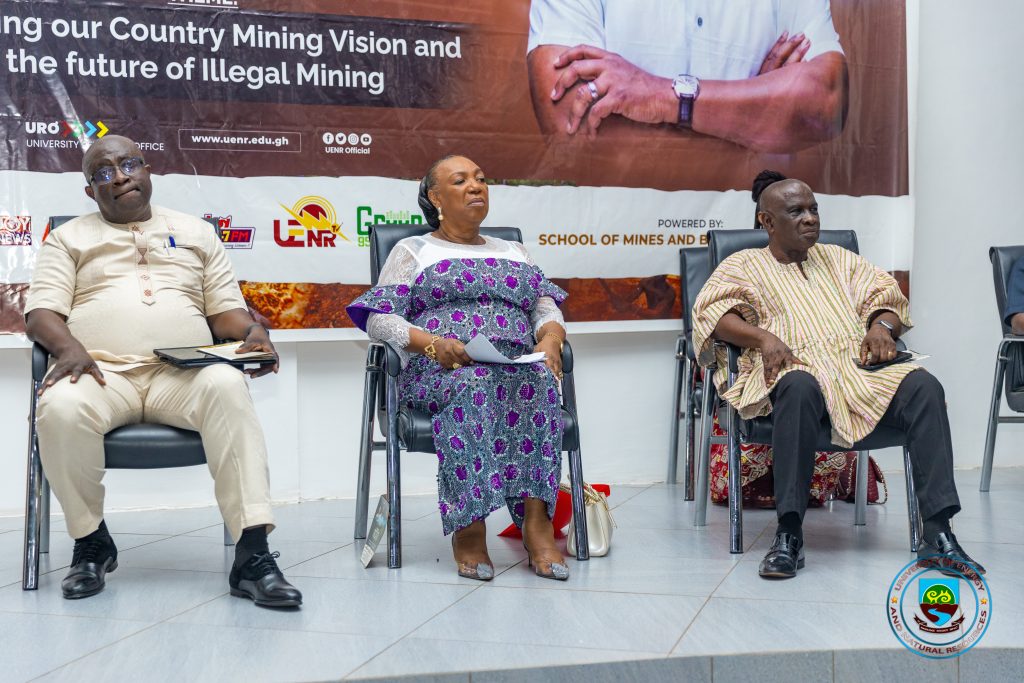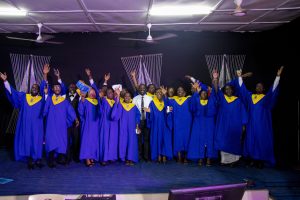
The Former President, H.E. John Dramani Mahama and NDC Presidential Candidate speaking at the 3rd Annual Transformational Dialogue on Small-Scale Mining held on May 15, 2024 unveiled plans to establish the Ghana Mining Excellence Centre (GMEC) as a cornerstone of his comprehensive vision for transforming the country’s small-scale mining sector.
The event, hosted by the University of Energy and Natural Resources, saw H.E. John Mahama outline a series of ambitious reforms aimed at curbing illegal mining activities and promoting sustainable practices. The GMEC, which will be coordinated initially by the University of Energy and Natural Resources (UENR) and the University of Mines and Technology (UMaT), is set to collaborate with international scientists to drive joint research and innovation projects. H.E. Mahama emphasized that the center would focus on fostering green growth within Ghana’s mining and minerals industry, leveraging evidence-based policies to guide responsible mining practices.

“Our goal is to ensure that research and innovation are at the heart of mining practices in Ghana,” H.E. Mahama stated. “This centre will serve as a hub for developing and implementing sustainable mining technologies and practices.”, said H.E. John Mahama
Addressing the immediate challenges posed by illegal mining, known locally as galamsey, H.E. Mahama highlighted the severe environmental damage inflicted on Ghana’s rivers and forests. He pointed out the dire consequences of unregulated mining activities, such as the pollution of the Ankobra and Pra Rivers and the devastation of the Atewa Forest Reserve.
“We cannot afford to lose our precious natural resources to the greed of a few individuals,” Mahama warned. “We must prioritize sustainable development and responsible mining practices.”

H.E. Mahama addressing participants at the Dialogue
H.E. Mahama outlined several key initiatives aimed at reforming the small-scale mining sector. These included establishing district mining offices in all mining areas to streamline the licensing process and enhance transparency. Staffed by officers from the Minerals Commission, the Environmental Protection Agency (EPA), and other relevant agencies, these offices will decentralize the licensing regime and increase the number of regulated small-scale mining companies.
Further, Mahama proposed amending the Minerals and Mining Act to grant district mining offices the authority to issue mining licenses. This move is expected to boost youth employment and foster greater involvement of mining engineers and graduates from UENR and UMaT in the sector.
Recognizing the critical role of traditional leaders, H.E. Mahama pledged to involve them in granting mining licenses, ensuring that community voices are heard and respected. He also stressed the importance of protecting cocoa farms and forests from the destructive impact of illegal mining, promising a ban on entry permits for mining in forests.
A significant aspect of H.E. Mahama’s vision includes the structural re-categorization of the mining sector into Small-scale (SSM), Medium-scale (MSM), and Large-scale (LSM) operations. Each category will have specific operational, environmental, and safety requirements, aimed at simplifying regulation and enhancing support for miners.
To support these reforms, H.E. Mahama plans to introduce advanced technological solutions, including artificial intelligence, to monitor mining operations, track equipment, and enforce geo-fencing to prevent unauthorized activities. A special revolving fund will be established to provide capital and access to mining equipment.
As part of his broader economic transformation agenda, H.E. Mahama announced the #Atree4life project, which will involve re-afforestation efforts by young people in mining areas, turning reforestation into an economically engaging activity. He also proposed initiatives to rehabilitate degraded lands and convert them into commercial crop production zones.

A section of Nananom at the Dialogue
Concluding his address, H.E. Mahama called for inclusive dialogue among all stakeholders, including miners, environmental groups, local communities, and the government. “It is time for us to come together and take decisive action to end illegal mining and chart a sustainable future for our mining sector,” he affirmed.
The dialogue underscored Mahama’s commitment to addressing the challenges facing Ghana’s small-scale mining industry and his vision for a transformed sector that benefits all Ghanaians.
Other Speakers were Hon. Betty Mould Iddrisu, Former Minster of Education and Former Minister for Justice and Attorney General and Founder, and Dr. Toni Aubynn, Founder and President-Africa Institute of Extractive Industries; Former C.E.O for Mineral Commission and the Ghana Chamber of Mines.

The Panel discussion moderated by Prof. Kwamena Panford at the School of Arts and Social Science of UENR centred on the topics ” Brainstorming the aspirations and ambitions of a new Ghana Mining Vision” and the functional roles and responsibilities of stakeholders in a sustainable Ghana Mining Vision.”








